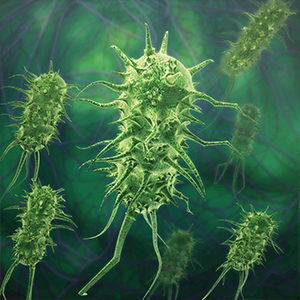Giardiasis (GEE-are-DYE-uh-sis) is a diarrheal illness caused by a microscopic parasite. Once a person or animal has been infected with Giardia, the parasite lives in the intestine and is passed in feces (stool). Because the parasite is protected by an outer shell, it can survive outside the body and in the environment for long periods of time.
In Washington State, 400 to 600 cases of giardiasis are reported annually. The most common exposures reported by Washington residents include recreational water exposure and international travel.
Anyone can get giardiasis. Persons more likely to become infected include:
Anything that comes in contact with feces from infected humans or animals can become contaminated with the Giardia parasite. People become infected when they swallow the parasite. Giardiasis is commonly spread person to person when the ill person does not adequately wash their hands after using the toilet and then contaminates another person’s food or drink. Lastly, Giardia is sometimes found in water or on surfaces, or soil contaminated with the feces from infected humans or animals.
A person can spread giardiasis as long as organisms are in the stool.
Giardia infection can cause a variety of intestinal signs or symptoms, which include:
These symptoms may lead to weight loss and dehydration. Some people with Giardia infection have no symptoms at all. Symptoms may last 2 to 6 weeks, but can sometimes last longer. Medications can help decrease the amount of time symptoms last.
Symptoms of giardiasis can begin between 3 to 25 days after becoming infected, with the average being between 7-10 days.
No. It is possible to contract giardiasis multiple times.
Giardia infection can cause lingering symptoms and complications, especially in infants and children under 5. The most common complications include:
There is no vaccine to protect against giardiasis.
Transmission can often be prevented by regular and thorough hand washing.
Avoid drinking water that might be contaminated.
Avoid eating food that may be contaminated.
Practice safe swimming.
- Take children to the bathroom frequently or check their diapers often.
- Change diapers in the bathroom or a diaper-changing area, not by the water.
Giardia infection can be treated by several prescription medications. Contact your healthcare provider.

Epidemiologists monitor, track, and respond to infectious disease in the community to prevent spread of illness.

Working with providers on the incidence, distribution, and possible control of diseases, illnesses and other factors relating to health.